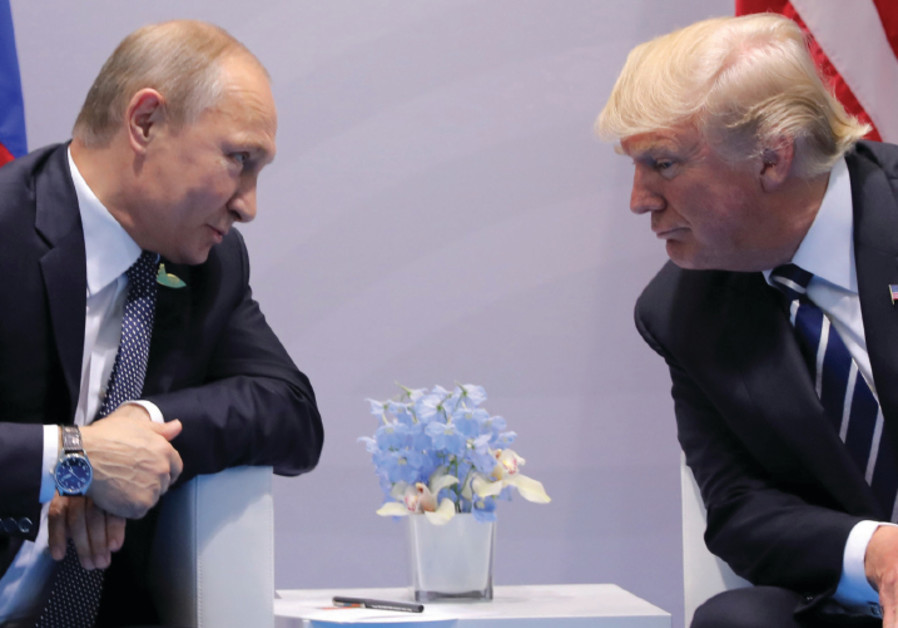Trump, Putin to meet amid Iran tensions

Russia’s President Vladimir Putin faces off with US President Donald Trump at the G20 summit in Hamburg on July 7, 2017. (photo credit: CARLOS BARRIA / REUTERS)
US President Donald Trump will meet Russian President Vladimir Putin on Friday in Osaka during the G20. The meeting will cover a variety of issues, including Iran tensions, Venezuela, Afghanistan and Syria, according to reports.
Russian presidential aid Yury Ushakov confirmed the meeting and said it will take place on the sidelines of the G20 for around an hour, according to Russia’s Tass News. ABC said that Trump told reporters he expected to have a good conversation, but that it’s content would not be public. Trump has been criticized in the past in the US for controversies related to his 2016 presidential campaign and allegations of Russian meddling.
The meeting comes as Russia says that it will begin deliveries of its S-400 system to Turkey in July and complete the process by the end of the year. Washington has warned Ankara that acquiring the system will risk its work with the F-35 program and could harm its alliance with NATO. Acting US Defense Secretary Mark Esper met his Turkish counterpart in Brussels on Wednesday.
Russia’s role in Syria is also on the agenda because of US concerns about what may come next in the war-torn country. First of all, America does not want a Syrian regime offensive in the North and it wants to stabilize eastern Syria, where its Syrian Democratic Forces partners are still combating ISIS sleeper cells. Russia’s air defense recently intercepted drones flown from Idlib in northern Syria that sought to attack a Russian airbase in Syria.
Russian Foreign Minister Sergey Lavrov slammed new US sanctions against Iran on June 25. He said that they were a reminder of historical failed US policies in the region, including the 2003 invasion of Iraq. “All of us know the result. In May 2003, the US declared victory of democracy in Iraq. Draw your conclusion on how this democracy has demonstrated itself over the past 16 years,” Tass quoted Lavrov as saying. This is a “bad scenario” regarding US-Iran tensions.
NATO-Russia tensions are also rising with calls for Moscow to destroy a nuclear-capable missile system known as the 9M729/SSC-8. The June 25 announcement continues to put Russia on a confrontation track with Western powers. Moscow has generally gambled that Western countries are willing to talk and condemn, but not do anything.
Russia has played a key role in recent discussions with Iran at two summits in central Asia and a conference in Ufa. Moscow is concerned about a conflict between the US and Iran, preferring diplomacy. Russia’s concerns are well founded. It knows that the Syrian conflict, after eight years, is winding down and that to preserve the Assad regime requires that no new conflicts break out.
It also knows that any conflict between the US and Iran will affect Syria and Iraq. Russia has interests in both countries. Furthermore Russia has been balancing relations with Israel and Syria. A recent meeting in Israel with US National Security Adviser John Bolton and his Israeli and Russian counterparts was important.
The time allotted to the Trump-Putin meeting, however, does not appear to be enough for them to discuss all of the important regional issues. How can they go over Afghanistan, Syria, Iran and other files that need urgent attention? The US wants to wind down its role in Afghanistan and it wants to keep eastern Syria peaceful.
In contrast to what appears to be Russia’s increasingly close relations with China, Turkey or even Iran, the US-Russia relationship, tense for several reasons, is still key to brokering successful outcomes in Syria and other countries. This is especially true because Moscow and Washington often find themselves on opposing sides.
Join Jerusalem Post Premium Plus now for just $5 and upgrade your experience with an ads-free website and exclusive content. Click here>>






Comments are closed.